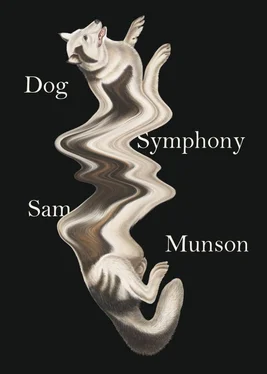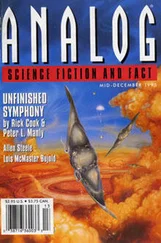As the security officer had done before him, he held it up, looked from it to my face, looked from the digestive pupil of the state to the digestive octagon, and then said: You look like you’ve lost weight, Mr. Pasternak. He asked me my destination, and after I told him, he asked why on earth I wanted to go to Chile. A smile, as ivory as his pate, appeared as I babbled out an answer in earnest: I had always wanted to see the famous town Antofagasta, I said, due to my great amateur interest in copper mining, the town’s historical industry. Sweat burned in my scabbed eyebrows, and the clerk released a dusty laugh or curt belch. You do not strike me as the type to be interested in historical main industries, said the clerk. I assured him I was, that while I had come to Buenos Aires for a conference I had a strong personal interest in all historical industries, especially copper mining. The clerk stroked his sternum (above the heart) with a placatory hand, which resembled an inflated sterile glove. I started to assure him again that I was a lover of industry, but he interrupted me: One moment, Mr. Pasternak.
He turned and opened the safe with three deft movements of his swollen hand and tossed my passport into the thick darkness it contained. I objected, but the clerk repeated his injunction: One moment, sir. He shut the safe. On the wooden lip that served as his clerical counter were two objects, a (sky-blue) telephone and a dense-looking registry (bound in sky-blue leather). Each page frail enough to mildly transluce as he turned it with a licked, leaden finger. Human voices rose and fell in the warm, scented evening. No train had yet arrived but this did not disturb the general, jovial calm of the other travelers, those standing on the platforms to the west, beyond the clerical hexagon containing Pasternak and dust motes. Here too the Department had placed no barriers to burgher behavior. Here too they counted on innate lackeyism to keep travelers from deviating, from violating procedure. And the insult, well, it pierced me more and more, crushed and insulted me more and more. I was swaying, now, my eyes on the endless kiosk floor tiling, my pupils twitching as they counted off: one, two, three.
The clerk finished leafing through the registry. He glanced up at me and fell into a swift, azure silence, an azure silence in which he glanced at the sky-blue phone on the lip of his kiosk. Stay where you are, please, he said in his dry, precise voice, I will return your document once we have finished here. You understand that I need to contact my superiors, said the clerk. And the void glared from his mouth, cloaking his molars. The clerk cried out in pleasure as he located the entry in the register he had been seeking. His grayish hand settled on the blue, curved receiver. He lifted it, showing me once more his vacuous, mephitically twinkling mouth.
In the filthy tunnels of memory, to my eternal guilt, I recalled that Ana was dead, gone from this life, gone at the hands of, gone at the mustache of. I recalled this only then despite earlier claims, only then, only now, now, now. Only as that black-mouthed clerk fondled the receiver. I rushed up to the waist-high partition between us and drove my fist into that starry nothing.
The clerk’s teeth tore open the sticky, serpentine wound across my knuckles left by a baton blow. His shoulders and head collided with the rear kiosk wall; he himself, or his soul, or his colon whined. I struggled over the wooden lip, I entered the choked hexagon within the kiosk, and I kicked the supine clerk in the face, I kicked him once, twice, three times, four, five. Each blow revived my bodily pain, each blow sent sweat stingingly into my open brows. The clerk piped whistling cries as sleep or shock dragged him down. He was old, but I do not apologize. He had the immortal Department as a conceptual parent, and a Department voice now spoke through the fallen receiver: Hello? Hello? Blood from the clerk’s mouth smudged my wingtip, and a gold incisor lay on the blank floor tile.
I looked through the three windows to my left and observed: no visible disturbance. The travelers gathered on the domestic departures platform, the squat family floated on the Bolivia platform, and the old man was still peeling his orange. To my east a fence, an empty, weed-broken concrete expanse (toward Ramos Mejiá, this expanded into a parking lot), another double set of empty platforms and tracks, Padre Carlos Mugica, and the spike-shaped southern tip of the shantytown, its roofs now dark. I let go of my sighing suitcase as the voice on the phone continued to chirrup. I checked the other platforms and the station exit again: no security officers swarmed out to arrest me, nothing at all except the aborted and dental platform lights. The distance to earth from this platform was negligible, about five feet, so — I leaped down. No one, I realized, could see me. No track workers, no signalmen paced this section, and I had a clear path to the fence. Cold and greased beneath my fingers, like the fence at the meat distribution company on Zenz. I was contemplating how best to climb over, when I saw a tear, half-concealed by a clump of melic, its furry stem tips nodding in the breeze. Gravel spattered as I worked my way through, and a sharp-ended cut fence link tore open my windbreaker, but not my skin.
The Department’s arrogance, its grand insult, resounded. I saw no one, no one at all in the parking lot, the cars (all white) contained no one and no attendant’s booth shone out at the front. Through the silence, the silence that always blankets the zone around train yards, the kiosk phone went on chirping. Even the mingling announcements from within Retiro reached my ears. I kept trotting along in the twilight, not too fast, toward the unwatched gate in the fence facing Ramos Mejiá. Above it curled a stunted, scentless jacaranda.
THE CITIZENS OF THE shantytown — in effect, the truest porteños — kept late working hours. This I observed for myself.
From ornament boxes or tangled piles, they lifted watch buckles, metal studs for trimming handbags, rolls of sateen lining, golden rabbit-shaped labels reading GENUINE PAMPAS HARE. A whole family in one house, mother, father, and triplet sons, all three faces stained red by a repetitive birthmark, sat at a card table and worked; in another, an old man and an old woman — who might have been siblings or husband and wife — engaged in the same labor as their radio blared out a Chopin barcarolle (I knew because my friend and colleague whistled phrases from it if her fury prevented her from speaking). Many of the shantytown dwellers, regardless of their age, wore jeweler’s loupes, which lent an inexplicable and utterly sinister element to their appearances. Euclidean scissors flashed in the dense, yellowed light, needles leaped and thread followed, pulled along with a nineteenth-century strength.
And in every house, too, I saw the same piles of objects next to the worktable. Stiff, hairy polygons, in many cases with the skin over the skull and the tail attached. The shantytowners worked with such speed that I saw the hides fully transformed: the pelt of a former fox terrier (I thought) was sliced up in threes and made into watchbands, and with the skin that once covered a mastiff the old couple sewed a handbag. They caught me spying but didn’t seem to care, they both grinned and waved, and called out: Good evening, sir. Then they sewed a clasp onto the handbag’s gaping mouth, set it aside, and picked up another skin. Ink-black and softly shining.
As befits a sufferer in a dream, I had no specific idea where I was, only that I was heading northwest toward my goal: the American Consulate on Colombia just south of Avenida de Libertador. Streets here, however, had no names. The lanes and alleys lacked public lighting as well. Most illumination came from within the houses. The shantytown dwellers filled the narrow streets, moving from house to house, asking their neighbors how the work was going, reporting on their own “progress” — that’s the term they used repeatedly. A young man, tall and wedge-shaped, wearing an amethyst-purple tracksuit with the name KATALINSKI lettered across the shoulders, seemed to be organizing this procedure. He looked in almost every window, smiled, waved, and reminded the dwellers: There’s a truck coming every day this week, so don’t worry if you have too much for the A shipment. He even said hello to me. Smiling, silent children, boys and girls alike, weaved left and right, pushing wheelbarrows full of skins (heading southeast) or finished goods (heading northwest, like me). Katalinski paid close attention throughout all his greetings and unctuous encouragements to the wheelbarrow bearers, nodding, making hard, curt gestures with a finger, and the kids obeyed with a speed that unnerved me.
Читать дальше












